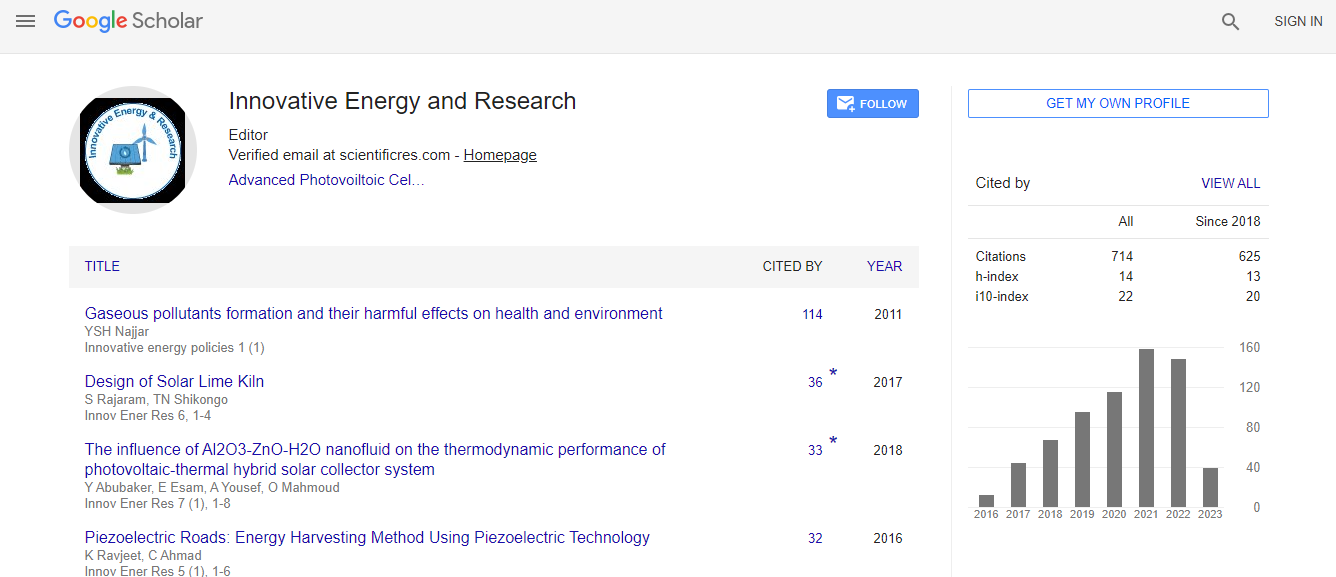Our Group organises 3000+ Global Events every year across USA, Europe & Asia with support from 1000 more scientific Societies and Publishes 700+ ������ Journals which contains over 50000 eminent personalities, reputed scientists as editorial board members.
������ Journals gaining more Readers and Citations
700 Journals and 15,000,000 Readers Each Journal is getting 25,000+ Readers
Citations : 712
Indexed In
- Google Scholar
- Open J Gate
- Genamics JournalSeek
- RefSeek
- Hamdard University
- EBSCO A-Z
- Publons
- Euro Pub
- ICMJE
Useful Links
Recommended Journals
Related Subjects
Share This Page
Promising oxy borates for solid-oxide fuel cell applications
20th International Conference on Advanced Energy Materials and Research
Olivier Joubert
Jean Rouxel Institute of Materials in Nantes - CNRS, France
Keynote: Innov Ener Res
DOI:
Abstract
The research on solid oxide fuel cell (H+ or O2- SOFC) is based on both the synthesis of new materials and the design process of the cell. The main advantage of SOFC is that they can work under hydrocarbon fuel at temperature higher than ≈700°C. In the current SOFC systems, the most widely used electrolyte is yttria-stabilized zirconia (YSZ) which is inexpensive and shows an acceptable conductivity level. But YSZ is very refractory and its major drawback is its reactivity during the sintering process with lanthanum- and strontium-based cathode materials, which leads to the formation of an insulating layer such as SrZrO3 or La2Zr2O7. There is also a great interest to find ceramic based fuel cells, for mobile application, working at low temperature (≈400°C). This can be achieved in H+-SOFC with a ceramic membrane showing a good proton conductivity level. The state of the art perovskite type yttrium-doped BaCeO3 (called BCY) shows a proton conductivity level above 1 mS/cm at 400°C. But due to its high basicity, BCY tends to decompose, in this temperature domain, in air containing CO2. Finding new electrolyte material is one of the issues. In this presentation, after a briefly state-of-the art concerning SOFC electrolyte, we will report on high-temperature proton and oxide ion conductivities in two new class of oxyborates, La26O27(BO3)8 and doped Ba3Ti3O6(BO3)2 compounds. Both samples were prepared by solid-state reaction and characterized using x-ray diffraction and electrochemical impedance spectroscopy. Quite high conductivity level, about 6.8×10–4 and 1.5×10–4 S/cm at 700°C in air were observed respectively. The transport properties can be understood in terms of the presence in high concentrations of oxygen and barium vacancies as well as oxygen interstitials as observed in hybrid density-functional defect calculations. Recent Publications 1. Lebreton M, Delanoue B Baron E, Ricoul F, Kerihuel A, Subrenat A, Joubert O and Le Gal La Salle A (2015) Effects of carbon monoxide, carbon dioxide, and methane on nickel/yttria - stabilized zirconia-based solid oxide fuel cells performance for direct coupling with a gasifier. International Journal of Hydrogen Energy 40(32):10231-10241. 2. Jarry A, Joubert O, Suard E, Zanotti J M and Quarez E (2016) Location of deuterium sites at operating temperature from neutron diffraction of BaIn0.6Ti0.2Yb0.2O2.6-n(OH)2n, an electrolyte for proton-solid oxide fuel cells. Physical Chemistry Chemical Physics 18:15751. 3. Quarez E, Noirault S, Caldes M T and Joubert O (2010) Water incorporation and proton conductivity in titanium substituted barium in date. Journal of Power Sources 195(4):1136-1141. Noirault S, Célérier S, Joubert O, Caldes M T and Piffard Y (2007). 4. Noirault S, Célérier S, Joubert O, Caldes M T and Piffard Y (2007) Incorporation of water and fast proton conduction in the inherently oxygen deficient compound La26O27(BO3)8. Advanced Materials 19(6):867–870. 5. Doux J M, Hoang K, Joubert O and Quarez E (2017) Oxygen ion transport and effects of doping in Ba3Ti3O6(BO3)2. Chemistry of Materials 29:6425−6433.Biography
Olivier Joubert is a Professor at Nantes University and Chairs the Fuel Cell group of Institut des Matériaux Jean Rouxel (CNRS-IMN). His major research interests concern new ceramic materials. He has participated to the development of novel ion and proton conductors as electrolyte for solid oxide fuel cell and electrolyser and also anode materials. He is co-author of 95 publications, 20 invited talks and 5 patents. He is chairing the HySPàC research grouping which assembles all French academic research groups in the field of production and storage of hydrogen and also fuel cell and electrolysers, about 108 laboratories mainly from the CNRS and CEA. He is the main organizer of the IDHEA meetings held in Nantes in 2014 and 2016. He is in charge of the expertise cell ERIMAT in Capacités SAS, a private subsidiary of the University of Nantes dedicated to the development of research, and provides assessment, advice to industries.
E-mail: Olivier.Joubert@cnrs-imn.fr

